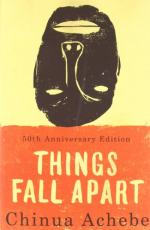|
|
Things Fall Apart Topic Tracking: Status
Chapter 1
Status 1: Okonkwo became an important part of his village early in his life when he defeated Amaline the Cat in a wrestling match. His victory made him a celebrity among the nine villages of Umuofia because Amaline had been undefeated for seven years. At this point, Okonkwo began on the path to high social status among his village, which was his goal throughout his life.
Status 2: Okonkwo hated his father because he was a lazy debtor. Unoka could never afford to purchase a title for himself or to have more than one wife, and so he was looked down upon by his neighbors and his own son because his primary joy was in music and merry-making rather than work, wealth, and warfare.
Status 3: The elders of Okonkwo's village held him in high esteem. Because of his place in society, they entrusted him with the life of a boy sacrificed to them by the people of a neighboring village as a peace offer.
Chapter 2
Status 4: Because of his great wealth, courage, and social esteem, Okonkwo was chosen by his village to act as an ambassador of war and meet with another village to work out the terms for settlement when a woman from Okonkwo's village was killed by people from the neighboring village. While Okonkwo was in the village of the offenders he was treated with great respect because of his social status.
Status 5: When Okonkwo learned that the word for a man without a title in Ibo is the same word that means "woman," he was crushed because to him that meant that his father (who had no title) was basically a woman. That's when Okonkwo became obsessed with social status and because of that obsession, he would do anything to protect his image as a strong man in his village.
Chapter 3
Status 6: Okonkwo began his pursuit of wealth and status early on by going to a wealthy villager and asking for support. Nwakibie loaned Okonkwo enough seed yams to begin a productive crop. Starting out as a sharecropper was not the ideal situation because that meant he only got one-third of the crop he slaved over. But that was the only option Okonkwo had because of his father's poverty.
Chapter 4
Status 7: Okonkwo disrupted the Week of Peace by beating his wife. For violating the sacred holiday, he was forced to pay a penalty. Although Okonkwo knew that he was in error and regretted his act against the gods, he did not show his regret to the villagers because he did not want to appear weak. But his pride made his neighbors believe that he no longer revered the gods and that his success had gone to his head.
Chapter 7
Status 8: Although one of the oldest tribe members warned Okonkwo against having a hand in Ikemefuna's death, Okonkwo struck the final blow that killed the boy because he was afraid that the other men in his tribe would think he was weak if he did not.
Chapter 10
Status 9: Okonkwo held a position of very high esteem as the egwugwu for his village. These men who dressed as ancestral spirits and took part in the funerals of great men as well as presided over judicial matters for Umuofia were part of a secret society. Playing this role for his village was a sign of his high social status and Okonkwo took great pride in it although he could not brag about it because his role was supposed to be a secret.
Chapter 19
Status 10: Okonkwo regretted his exile primarily because it stunted his social growth. If he had been in his village for the previous seven years he would have gained other titles and his younger sons could have begun buying their own titles. Although he prospered in Mbanta, his progress there meant nothing because it did not increase his stature in his native village.
Chapter 21
Status 11: Okonkwo is disgusted by the white men's presence in his home village not only because of the way that it destroys the unity of the clan, but also because it distracted the villagers of his home from celebrating his return. Because of all the changes in Umuofia, no one noticed that he and his family came home, which showed that his social status had diminished.
Chapter 25
Status 12: In the end, Okonkwo's status among his tribe counted for very little because his own despair over the colonization of his native land led him to kill himself. Suicide was a great sin against the Earth. Because he took his own life, Okonkwo, a great leader of Umuofia, had to be buried by strangers without even the ceremonial rites that a man of his status deserved. All of his work and perseverance amounted to nothing because he had been broken by colonization.




